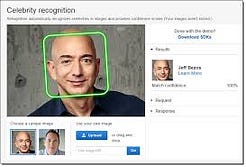As computer vision expands its influence in the human world, there are many things to consider in regard to how it will change the way we view our lives and how we actually live it. We look now at just a few of the advances computer vision has given us
Sky’s The Limit
All around us — and most of the time without us even realizing it — computer vision (CV) is being used to enhance our lives. With our iPhones and its Face ID technology to unlock your smartphone as a case in point, not to mention the countless other services and apps that have pooped up on the market of late, we’re headed in the right direction as far as innovation is concerned.

Source: dribbble.com
Technology is progressing at an unbelievable pace.
Things that were only a dream in 2010 are now the de facto reality. The algorithms of deep learning and graphics processors have brought us into a world where computers can think and see more like their human counterparts.
And it can only get better.
New levels of development have been achieved. The sky’s the limit for the future of CV with the advent of better, more sophisticated processors which not only the large tech firms have access to anymore. The wider availability of software in deep learning has democratized this area of the tech industry.
Leading Players
Facial recognition software, with the likes of tech giants Amazon and its Rekognition software, and the San Francisco-based Looksery, which allows users in their videos or photos to replicate their physical features, are changing the technological landscape forever and breaking through into new realms of the possible.

Will Jeff Bezos and his Rekognition software dominate in CV too? Source: Amazon.com
These, along with other striking projects in CV, are a clear indication that what is being developed of late in the technology is realigning to what the apps’ designers have been wanting to create for a long time. Additionally, computer vision applications will become considerably less expensive to research and develop, making them readily available to startups and the masses.
Facial technology company’s like Kairos, ‘the leading face recognition AI company with an ethical approach to identity’, Affectiva, an emotion measurement technology company that can track facial expressions and the nuances of the human face through emotions and, finally Open CV, as the name suggests an open source community originally founded by Intel, all offer different options in the realm of CV.

Kairos, one of the big players in CV on the market
Minor Leagues
Startups, too, like Shazura out of California, the German-based Nyris and Intello Labs from India, are all hungry for success and for pushing the boundaries in the field of computer vision. Yet, with these and other companies moving forward, the accumulated knowledge banked will, it is hoped, contribute to a better society for the rest of us where we are taxied around by driverless cars and can shop at the store without a cashier.
Amazon Stores
It’s not only with Rekognition where Amazon is leading the way, but it has also brought about the concept of cashierless shopping with its Go stores in Seattle and Chicago. The idea is ingeniously simple:
you use the Amazon Go app to gain access to the store. Once in, you buy what you need before leaving. Groceries are charged directly to the customer’s Amazon account. Within the store, which sells everything from drinks to frozen TV dinners, there are hundreds of sensors and cameras which track the customers’ movements and analyse what people are buying.

The exterior of an Amazon Go store. Source: Wikipedia
Currently, this technology is too expensive to be rolled out by every Tom, Dick and Harry, though when it does become more widely available, we will see startups and local businesses adopting these functioning computer vision products to their services and business practices wide scale.
Breakthrough AI
Computer vision as a concept is so vastly different from anything that has gone before in the world of technology in the AI field. Contrary to traditional technological innovations over the decades, CV is completely unprecedented, because there is nothing to base it on like in some other areas of AI where innovations have been imperceptible but purpose driven and still positioning for improvements. Many see CV perception tweaking its vision and then, finally, surpassing that of its human equivalent.
The fact that CV, as opposed to other forms of AI, relies on image data sets inputted by human operators to align with the world around them is proof it can improve with time. CV infers image sets — even an infinite number of them — as empirical truths of vision. The data is in real time and does not rely on undetermined hypotheses of future events, as in other branches of AI like deep learning, where the computer is programmed to find patterns and make predictions from data based on work in multivariate statistics, pattern recognition, predictive analytics and also data mining. Once this empirical data has been learned there is no need for further work on the side of the operator(it is hoped).

Photo by Daniil Kuželev on Unsplash
The algorithmic system of CV, therefore, counts only on humans labelling, categorizing and archiving images for future CV recognition work, whereas other forms of AI require an epic amount (or even infinite number) of training data to solve a limited number of future occurrences based on the counterfactual reality of the undetermined.
Everyday Uses
Although — as is the case with Amazon’s Go stores and fun phone apps — we can see CV being used to help assist humanity. However, with more money and investment, big business for sure will use CV for its own purposes. Already heat maps are being utilized by car insurance companies working to track and locate areas of the worst damage when a car gets involved in a traffic collision.
Risk Assessment
CV for driverless cars is the sexy niche at the moment which everybody is talking about, but with accidents like Uber’s autonomous test car hitting and killing a pedestrian in Tempe, Arizona last year, it’s an obvious case of ‘back to the drawing board’ with more work in the research department still needed to make it safer for passengers.
But who knows, when technology becomes more advanced, and the price of investment doesn’t break the bank, maybe then computer vision and augmented reality will help us live better lives.
Pot of Gold
With the market looking bright, there’s no stopping CV. Market Research Future Reports did a report and estimates the computer vision market will be valued at nearly $50 billion by the end of 2023.
Good news for investors and scientists involved in CV.
So, exciting times ahead, though not without a lot of heavy graft left to do.




